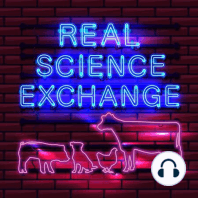73 min listen

Waste to Protein on the World´s Smallest Footprint: How to produce, apply and utilize insect products now and in the future with Katharina Unger of LI…
Waste to Protein on the World´s Smallest Footprint: How to produce, apply and utilize insect products now and in the future with Katharina Unger of LI…
ratings:
Length:
70 minutes
Released:
Jun 6, 2023
Format:
Podcast episode
Description
Guests: Dr. Katharina Unger & Pratibha YadavJoining the pubcast to discuss insect protein as an alternative for the future is Dr. Katharina Unger and Pratibha Yadav. Dr. Unger is the CEO and founder of LIVIN Farms and an expert in edible insects and food innovation. She led the conversation by introducing her background and briefly mentioning the transformation of using insects as food protein. 8:35Dr. Unger said she started questioning early in her career the required resources needed to produce livestock at a larger scale. After many years of research, carbon emissions studies and searching, an additive that can grow protein on the smallest possible footprint came to the forefront; insect protein. 9:41Dr. Unger mentioned insect protein is highly digestible and for animals has an attractive taste. In addition, the environmental impacts of turning waste into protein is an effective organic byproduct. 11:05Yadav discussed how the opportunity to utilize the black soldier fly was a decision based on its opportunity to offer low quality substrates and synthesize biomolecules into amino acids quickly. 19:30While LIVIN Farms continues to have projects in Europe, Dr. Unger mentioned the team also does additional research in other regions which allows a wide variety of demographics to study when analyzing substrates and improvement factors. 23:17Yadav said byproducts are already there for certain insect substrates and byproducts. In fact, she went on to say it’s a practical option as livestock production systems can be fed insects by crushing, mixing or distributing them as a way to save on costs and processing fees as well. 32:52 While the entire insect larva process is vertical farming, Dr. Unger mentioned from the start of production to the automated warehouse and then into the two layer systems, they are never dependent on the soil. 39:10In an effort to produce with the smallest possible footprint, the input substrate must have an adequate amount of protein, fat and carbohydrates during the nutrient composition, Yadav mentioned. 41:43Wrapping up the conversation, Dr. Unger summarized the visionary work being done with insects as protein alternatives and restated the value the resource has on the planet's ability to secure the food system and provide indefinite solutions for the future. 1:07:25Please subscribe and share with your industry friends to bring more people to join us around the Real Science Exchange virtual pub table. If you want one of our new Real Science Exchange t-shirts, screenshot your rating, review, or subscription, and email a picture to anh.marketing@balchem.com. Include your size and mailing address, and we’ll get a shirt in the mail to you.
Released:
Jun 6, 2023
Format:
Podcast episode
Titles in the series (100)
Transition Cows, Looking in the Rear-View Mirror as We Speed into the Future: Tonight, is our second installment of what we call our legacy series. The legacy series honor those individuals that have a profound impact on our industry. For this conversation, we're going to zero in on the history of transition cow management. We are joined by Dr. Ric Grummer and Dr. Heather White from University of Wisconsin-Madison and Dr. Jesse Goff of Iowa State University. by Real Science Exchange